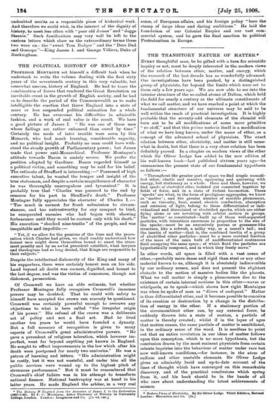THE POLITICAL HISTORY OF ENGLAND.*
PROFESSOR MONTAGUE set himself a difficult task when he undertook to write the volume dealing with the first sixty
years of the seventeenth century in this very valuable, but somewhat uneven, history of England. He bad to trace the combination of forces that rendered the Great Revolution an inevitable event in the growth of English society, and he had so to describe the period of the Commonwealth as to make intelligible the reaction that threw England into a state of more or less suspended political animation for a whole century. He has overcome his difficulties in admirable fashion, and a work of real value is the result. We have a good picture of James I. "He was one of those men whose failings are rather enhanced than cured by time."
Certainly the seeds of later trouble were sown by this Monarch, who had much learning, considerable sagacity, and no political insight. Probably no man could have with- stood the steady growth of Parliamentary power ; but James made that power anti-Monarchical. Professor Montague's attitude towards Bacon is unduly severe. We prefer the position adopted by Gardiner. Bacon regarded himself as a political victim, and something may be said for his belief. The estimate of Strafford is interesting :—" Possessed of high executive talent, he wanted the temper and insight of the true statesman, and despite a certain magnificence of character he was thoroughly unscrupulous and tyrannical." It is probably true that "Charles was pursued to the end by remorse for his part in Strafford's death." Professor Montague fully appreciates the character of Charles I. :— "Too much in earnest for frank submission to circum- stances, and too untrustworthy for any compact to bind, he exasperated enemies who had begun with showing forbearance until they would be content only with his death" His execution "shocked nine-tenths" of the people, and was inequitable and impolitic :—
" Yet, if we allow for the passions of the time and the provo- cation which Charles had given, we shall readily understand how honest men might deem themselves bound to exact the utter- most penalty and by an awful precedent establish, what lawyers and theologians had so long denied, that Kings are responsible to their subjects."
Despite the intellectual dishonesty of the King and many of his supporters, there were certainly honest men on his side. Laud beyond all doubt was earnest, dignified, and honest to the last degree, and was the victim of rancorous, though not dishonest, persecution.
Of Cromwell we have an able estimate, but whether Professor Montague fully recognises Cromwell's immense powers may be doubted. That he could with safety to himself have accepted the crown can scarcely be questioned.
Cromwell was certainly powerful enough to overawe any objections to what is here called "the irregular origin of his power." His refusal of the crown was a deliberate act of policy and not a final act. Had be lived another ten years he would have founded a dynasty. But a full measure of recognition is given to many aspects of Cromwell's great administrative powers. "He gave a precedent of religious toleration, which however im- perfect, went far beyond anything yet known in England. He sought to effect improvements in the law which after his death were postponed for nearly two centuries." He was a patron of learning and letters. "His administration might be costly, but it was not wasteful, and under him all the public services were wound up to the highest pitch of strenuous performance." But it must be remembered that Cromwell's chief failure was in his attempt to transform national finanoe. National bankruptcy was at hand in his latter years. He made England the arbiter, in a very real
* The History df England frcnn the Accession of Jaynes I. to the Eestoration (16)3-1600). By F. C. Montague, Astor Professor of History in University Colima, London. Loudon : Longniann and CO. [7.1. 63. ust-.1 sense, of European affairs, and his foreign policy "bore the stamp of large ideas and daring ambitions." He laid the foundation of our Colonial Empire and our vast com- mercial system, and he gave the final sanction to political Protestantism in Europe.






































 Previous page
Previous page